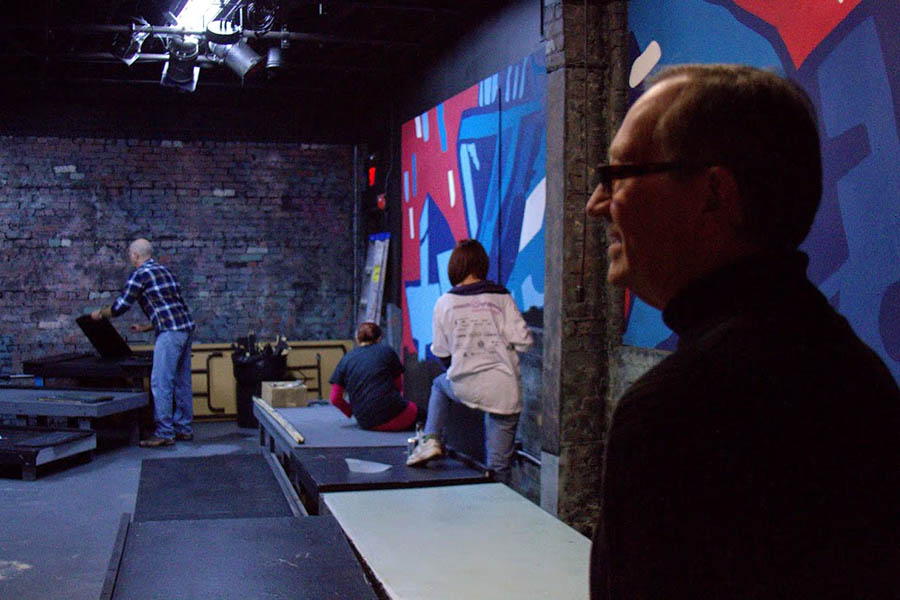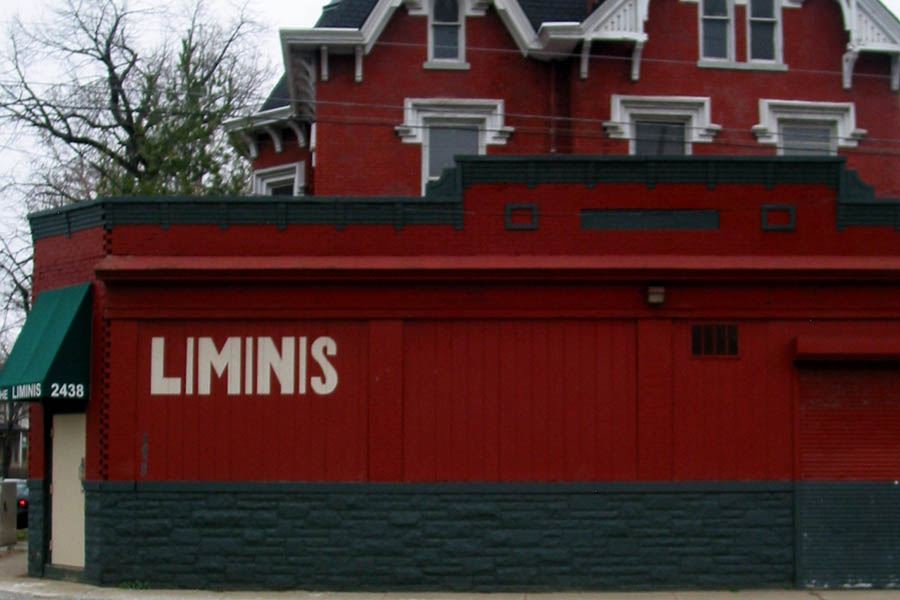In late fall 2015, Clyde Simon, artistic director and owner of convergence-continuum theatre, surprised the company’s board of directors when he announced that he needed to sell the building. Located in the historic Tremont District directly south of downtown Cleveland, con-con’s theatre is attached to a 150-year old house which then served as both Simon’s residence and the theatre’s backstage area.
Simon, who cofounded the company in 2000, was close to his 70th birthday and needed to step back from being owner, landlord, and maintenance man. Retired from teaching and various jobs, he also needed to remove the financial burden of $1,700 monthly mortgage payments, an annual $3,500 insurance bill, and numerous maintenance and repair costs from his shoulders. That was all on top of the initial debt he and cofounder Brian Breth, who had since moved to L.A., incurred when they emptied their savings accounts and maxed out their credit cards to pay $160,000 to purchase their “dream” home and 40-seat Liminis Theatre space, a rectangular structure that had been added to the house. Another addition to the house held two apartments, but the tenants’ rent basically covered the interest payments.
Simon offered the board the option to buy the property for a significantly reduced price of $130,000. In Cleveland’s fast-moving urban resurgence, the building was worth at least twice that on the open market. The bad news? They only had until the end of 2016 to raise the money.
By offering the building at a low price, Simon increased the chances that he could sustain the theatre company he loves. “By making a cash purchase, which was exactly the balance of my mortgage, con-con wouldn’t have the big financial burden of mortgage payments, and the tenant’s rent would become a source of income,” Simon explains.
But, while it was a dream real estate deal and opportunity to continue con-con’s distinct brand of alternative, experimental, and absurdist fare, it still presented a daunting challenge to the small company. (Full disclosure: I am a board and company member at the theatre, and they’re producing a play of mine later this year.) “Due to the sudden announcement of an end-of-2016 deadline, we did not have a lot of time to plan,” recalls Geoffrey Hoffman, actor, director, and vice president of the board. “We scrambled, had a board meeting and company meeting, then announced the campaign and figured it out as we went.” Hoffman volunteered to lead the charge as chairperson of the capital campaign. As a licensed real estate agent, Hoffman is uniquely well qualified for the job.
According to board president James Smith, the board discussed various options at a series of meetings, including selling the building to a third party and having the theatre company rent the space, finding another suitable space in the Tremont neighborhood, or folding the company.
“We decided that the best course of action would be for us to purchase the building on its own by conducting a capital campaign to raise $200,000 to cover the purchase cost and have $70,000 for operating funds,” Smith says. “That way the company could expand its financial and artistic footing by establishing an endowment, creating new sources of revenue through rental opportunities, and growing in our scope and mission.”
The initial challenge was to identify ways to inform, motivate, and mobilize con-con company members and patrons to assist in attaining this goal. “The company had to suddenly change gears and redefine the prevailing concept and image of convergence-continuum and our artistic mission quickly and strongly,” Smith adds. “For many of us, the tasks of a capital campaign involved going outside of our comfort zones and interacting with our public in a more outward, engaging way.”

(Photo courtesy of convergence-continuum)
Early in 2016, after a few more emergency meetings and group emails, the board carefully fine-tuned the message and objective of the campaign and took several steps to reach the goal. They:
- Expaned the board from six to 10 members to assist with the expanded leadership role and increase community contacts and resources
- Held a company meeting to announce the campaign, define its goals, and motivate company members to help
- Scheduled meetings with neighborhood groups to announce the campaign, make personal connections, and answer residents’ questions
- Created a revised company email list as a targeted distribution list to reach out to regular patrons and friends of con-con
“We quickly launched the campaign on Facebook, on our website, and through blast emails,” says Lucy Bredeson Smith, actor, and company manager, and Smith’s wife, who has worked at con-con for 15 years. “Our board members sent personal requests to all of their personal email contacts, too.”
When the board submitted grant proposals to foundations and corporations, the biggest challenge of the campaign emerged quickly. “Several foundations told us they don’t give grants for this type of campaign, to purchase a building,” Hoffman says. “Also, their maximum contribution could only be a certain percentage of our annual budget, which is small, resulting in a small maximum give.”
To the board’s great and happy surprise, a steady stream of donations rolled in from private individuals, such as company members, family, friends, and patrons. Donation amounts ranged from $5 to $12,500. “A key lesson for us was, don’t underestimate the generosity of your patrons and the community at large,” Simon says. “Explain the need, the reasons for the need, and ask. Enlist their support not only in donating, but in spreading the word personally, via group emails, Facebook posts, etc. We received donations from people out-of-town and out-of-state and people who had never been to our theatre, but responded to the enthusiasm of the folks who gave.”
Throughout the 2016 season, con-con kept a running tally and list of donors available on their website, in their programs, and via a thermometer graphic in the lobby so people could track the progress of the capital campaign. Essentially, they leveraged the personal passion that brings a faithful cadre of followers into the space for performances and moves company members to volunteer to help with set strikes and builds, run the box office, or put stamps on postcards for each show.
One company member, Cleveland actor Robert Hawkes, donated $5,000. “I contributed substantially to the campaign because I wanted to see con-con stay in the space which has defined its production style—off-the-wall, in-your-face stuff—and with which its audience identifies it.”
In November, with just two months until the deadline, con-con’s board was looking at a $30,000 shortfall. They redoubled their efforts to reach out to personal contacts and promote the campaign. Still short by almost $20,000 in December, a surprise donation of $10,000 from a company member’s parents dropped the remainder into a very reachable range and inspired others to donate. Con-con received a flurry of last-minute gifts, including a generous donation from Tom Hanks and Rita Wilson. Hanks, a long-time Cleveland fan, earned his Equity card in 1979 at then Great Lakes Shakespeare Festival, where he interned with the Smiths.
Just under the wire, the Board announced that it had successfully raised the $130,000 needed to buy the property from Simon. On Jan. 31, 2017, the title for 2438 Scranton Road transferred to the board and company of convergence-continuum theatre. Simon, who has happily relocated to a condominium in a nearby suburb, is reveling in the opportunity to devote more time and energy to his artistic director duties.
As of early May of this year, the theatre had raised $153,500 toward the $200,000 goal, giving con-con $24,700 of the $70,000 to create an improvement fund to maintain and repurpose some of the theatre spaces. Immediately after purchasing the building, the focus switched to raising money for the 2017 season’s programming budget goals. However, that push is completed, so the emphasis is once more on the capital campaign.
A strategic plan developed by a board committee in November will enable some of the foundations and corporations to consider grants toward this total for operating costs. The board also added two paid positions to address its new responsibilities: a facilities manager, Steve Bowen, and a house manager, Jean Leathers. Board member Cory Molner was appointed as executive director of the board, and the company expanded the stage manager role to include everyday facility needs.
Reflecting on the success of the whirlwind fundraising experience that, had it failed, could have resulted in the theatre going dark, but now will transform and elevate convergence-continuum, Simon concludes: “Having the entire Board fully behind the campaign was very gratifying and critical to our success. The level of buy-in and sense of ownership of the company members and new staff has energized everyone and will help us go even further in our artistic goals, as we embark on convergence 2.0 in what is truly the company’s home.”
Playwright/director Christopher Johnston’s play about Nikola Tesla, The Chaste Genius and His Deathray Gun, will premiere at the Liminis Theatre in December.


